| SHADOWS ON THE WALL | REVIEWS | NEWS | FESTIVAL | AWARDS | Q&A | ABOUT | TALKBACK | |||||
 Shadows off the beaten path Shadows off the beaten pathIndies, foreign, docs and shorts...
On this page:
ANOTHER ROUND |
THE SALT IN OUR WATERS |
NEW ORDER
| |||||
| See also: SHADOWS FILM FESTIVAL | Last update 19.Oct.20 | |||||
|
Another Round Druk Review by Rich Cline | 
| |||||
 dir Thomas Vinterberg scr Thomas Vinterberg, Tobias Lindholm prd Sisse Graum Jorgensen, Kasper Dissing with Mads Mikkelsen, Thomas Bo Larsen, Magnus Millang, Lars Ranthe, Maria Bonnevie, Helene Reingaard Neumann, Susse Wold, Magnus Sjorup, Silas Cornelius Van, Albert Rudbeck Lindhardt, Martin Greis-Rosenthal, Frederik W Rasmussen release Den 24.Sep.20, UK 20.Nov.20 20/Denmark Zentropa 1h57 TORONTO FILM FEST  Is it streaming? |
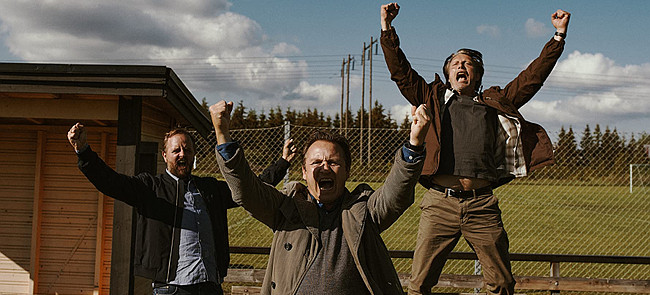 With his usually realistic approach, filmmaker Thomas Vinterberg takes a deep dive into Denmark's heavy drinking culture. Even with the high-concept premise, the film is beautifully character-based, centring on four middle-aged men on a frankly ridiculous quest to prove that humans achieve optimal performance with alcohol in their system. So as warning signs begin to appear, the shift from warm comedy to dark drama is astute, complex and provocative. In a lacklustre slump, history teacher Martin (Mikkelsen) is failing to prepare his students for exams. And his wife Anika (Bonnevie) and colleagues also know he's lost his spark. To boost his confidence, his teacher pals Tommy, Nikolaj and Peter (Larsen, Millang and Ranthe) decide to test a theory that maintaining a constant level of alcohol in the system will improve their lives. They set careful guidelines for this experiment, and all four perk up considerably. But of course problems start when they decide to raise their blood alcohol level just a bit higher. The original title is the Danish word for binge drinking, and the film sharply depicts how alcohol fuels many happy events. Conversations along the way casually note how drinking reduces stress and inhibitions. And famous drinkers like Churchill and Hemingway excelled while inebriated. On the other hand, there's a clip of a giggling Yeltsin and Clinton. So when this experiment begins affecting work and home lives, confrontations are powerful and moving. These four terrific actors expertly capture the shift from tired old men to lives of the party, as a few drinks loosen them into joking, dancing idiots. And their forensic approach to blood levels is fascinating. Mikkelsen holds centre focus skilfully, allowing his concealed feelings to emerge so that he's sympathetic even when he's clearly a mess. The camaraderie between Mikkelsen, Larsen, Millang and Ranthe is superbly balanced, shifting from thoughtful to exhilarating to out-of-control drunk. Skilfully shot and edited, the film is packed with superbly staged sequences in which these men both prove and disprove their hypothesis at the same time, such as when Martin seamlessly navigates the crowded breakroom then walks into a wall. Teens joke about drinking 55 units in a good week (the recommended level is 14). And as these men push their experiment further in the name of science, even they can see that they're heading toward danger. So it's remarkable that Vinterberg and the cast make their point without preaching to the audience or sacrificing the entertaining tone.
| ||||
|
The Salt in Our Waters Review by Rich Cline |  MUST
MUST  SEE SEE
| |||||
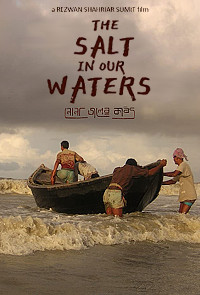 dir-scr Rezwan Shahriar Sumit prd Rezwan Shahriar Sumit, Ilann Girard with Titas Zia, Tasnova Tamanna, Fazlur Rahman Babu, Ashok Bepari, Naimul Rahman Apon, Shatabdi Wadud, Aminur Rahman Mukul, Dulari Begum, Nazmil Hasan, Mahmud Alam, Shatabdi Wadud, Babul Munshi release UK Oct.20 lff 20/Bangladesh 1h46  Is it streaming? |
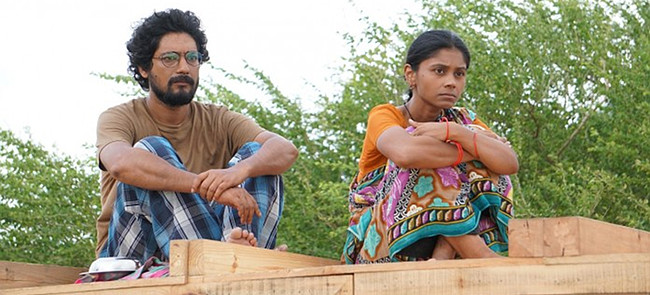 Skilfully shot in picturesque locations, this earthy drama from Bangladesh explores a tangled web of politics, religion, art and commerce in a rural community. The push and pull between traditional locals and an educated interloper is beautifully played, with a refreshingly textured script and offhanded performances. Filmmaker Rezwan Shahriar Sumit draws the audience into this riveting drama without over-egging the themes, so it's bracingly easy to identify with the characters. Travelling from Dhaka to the coastal delta, sculptor Rudro (Zia) is working on a project in a small village, invited by Bashar (Bepari), who introduces him into what he calls a poor but honest community. As Rudro begins working, he also teaches boys to create art, and he befriends bright 19-year-old Tuni (Tamanna), who warns him not to speak publicly to girls like her. Indeed, the strictly religious Chairman (Babu) doesn't like an idolator like Rudro distracting the children from their Koran studies. And further events put Rudro and the Chairman on a collision course. The setting is fascinating, a mangrove island that bears scars of frequent storms, abandoned colonial buildings and grey skies reflected in the silvery sea. Residents live under constant threat from monsoons and flooding, while keeping busy with fishing, cattle, boat hire and collecting wood from trees downed by storms. The Chairman pointedly warns Rudro that being in a small fishing boat will test his faith. But Tuni insists he has much to teach the villagers, if they would listen to him. The likeable Zia plays Rudro as thoughtful and observant. His easy-going approach means that he struggles with resistance from officials who think art is unholy then blame him for empty fishing nets. His interaction with Tuni is the heart of the film, and Tamanna plays her with alert attention to detail, evoking Tuni's yearning to escape with him. The villagers are all bracingly authentic, with Babu's serenely confident Chairman accepting no guff as he controls everyone and apportions guilt, blithely jeopardising lives. Tuni believes that change will never come to her close-minded village, but Rudro reminds her that she's the hope for the future. The narrative gently encompasses moments of suspense, emotion and even a tense trial and wrenching sentence. Some of the soapier plot points feel a little distracting, and the editing is perhaps a bit loose, but the story is riveting, a rare glimpse into an intriguing culture. And it's packed with meaning that resonates far beyond this corner of the world.
| ||||
|
New Order Nuevo Orden Review by Rich Cline | 
| |||||
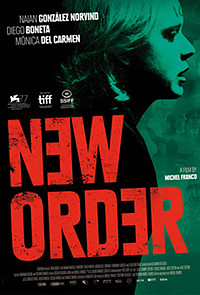 dir-scr Michel Franco prd Michel Franco, Cristina Velasco, Erendira Nunez Larios with Naian Gonzalez Norvind, Diego Boneta, Monica Del Carmen, Fernando Cuautle, Eligio Melendez, Dario Yazbek, Roberto Medina, Lisa Owen, Patricia Bernal, Enrique Singer, Gustavo Sanchez Parra, Leonardo Alonso release UK Oct.20 lff, US Oct.20 ciff, Mex 22.Oct.20 20/Mexico 1h28 VENICE FILM FEST TORONTO FILM FEST  Is it streaming? |
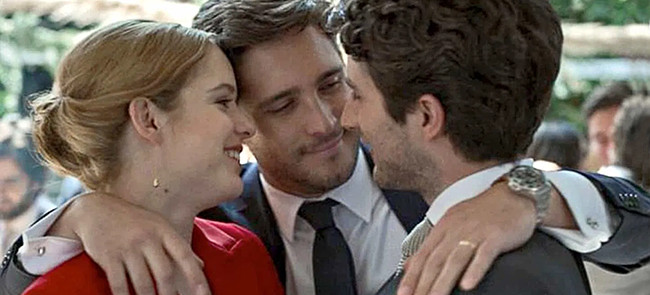 A dryly vicious satire, this Mexican drama opens with a wealthy crowd holding a lavish party while the city around them burns. And where it goes is deeply unnerving. Filmmaker Michel Franco deliberately shocks the audience by placing a horrific uprising in a major Western capital. What happens is familiar from news stories about places like Syria or Bosnia, so seeing it in a more familiar location is indeed chilling. As a Mexico City public hospital is overwhelmed by victims of brutal street riots, existing poor patients are pushed aside. But Rolando (Melendez) can't afford his wife's life-saving operation at a private hospital. So he travels to the home of his former employers, the Novello family, who are celebrating the wedding of Marianne and Alan (Norvind and Yazbek) at a huge party in their gated mansion. Her brother (Boneta) only offers token assistance, so a furious Marianne leaves to get more help. But the violence and looting spread into the party, and Marianne is kidnapped. A revolution in which the have-nots overthrow the one percent, the film evokes recent events expanded to a terrifying scale. Quickly, bodies are strewn everywhere, fires are burning in the streets and the braying crowd is only getting louder. In the aftermath, opportunistic militias sweep in to steal anything that's left, grabbing people for ransom. Months later with the city under a dystopian curfew, the dead are buried but people are still missing and being shot in the streets. And the story keeps twisting in nasty directions. Performances are solid, although it's difficult to follow the mayhem with such sketchy connections between characters. Norvind's Marianne has the most terrifying odyssey, caught outside the house, imprisoned and tortured by an armed gang. As her various somewhat ill-defined relatives, the supporting cast has strong emotional moments. And Del Carmen and Cuautle are notable as family employees who are put through a darkly harrowing wringer. This is not easy to watch, partly because it's so relentlessly grisly but also because the lack of context leaves the film as merely a blast of anger at a system that is so cruelly out of balance. But the callous murders are gut-wrenchingly hideous, so while Franco is highlighting injustice, he's also showing that, while there are many innocent victims, there are almost no actual good guys. And finally, as a parable about how lawlessness infiltrates every level of society, there's no space for hope here.
| ||||

See also: SHADOWS FILM FESTIVAL © 2020 by Rich Cline, Shadows
on the Wall
HOME | REVIEWS | NEWS | FESTIVAL | AWARDS
| Q&A | ABOUT | TALKBACK | | ||||

